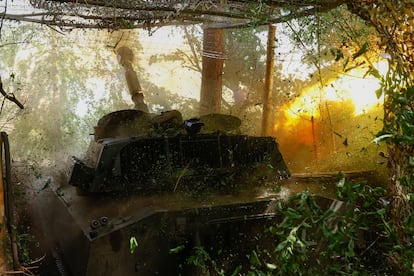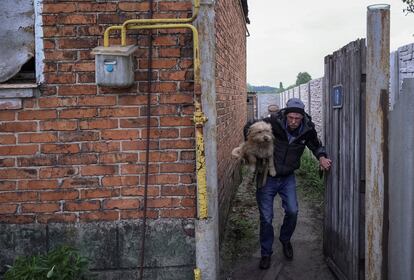Ukrainian reinforcements contain Russia’s advance on Kharkiv front
Zelenskiy visited the province where the Kremlin has opened a new offensive, describing the situation as ‘extremely difficult,’ but ‘under control’


Reinforcements are holding back Russia’s advance on the new front in Kharkiv province. The invader’s lightning offensive north of Ukraine’s second-largest city — which began on May 10 — has been stopped after rapidly moving forward in the first few days. Ukrainian soldiers fighting in the area confirm that battalions that were in reserve have been transferred to Kharkiv. EL PAÍS has been able to confirm as well that units of at least two brigades that were fighting on the Donetsk front have also been transferred to the new front.
The fact that Russia has halted its advance may confirm the theory of Ukrainian Ministry of Defense intelligence services: that the enemy’s goal in opening a new front of fighting north of Kharkiv is to force Ukraine to reduce its troops in Donetsk. Moscow’s main objective, according to the main Western military analysis centers, is to conquer the municipality of Chasiv Yar and advance towards Pokrovsk, two cities in Donetsk. In these two areas, the intensity of the Russian advance has also decreased. According to an officer of the Ukrainian 23rd Mechanized Brigade, who was fighting in Donetsk until last week, this could be to encourage Ukraine to move more troops towards Kharkiv. This soldier, who preferred not to give their name for security reasons, said that the fighting in places like Chasiv Yar is still much more bloody than in this area of the north-eastern province.
This newspaper was able to verify that Russian forces have retreated to the northern periphery of Vovchansk, the main border municipality north of Kharkiv, largely thanks to Ukrainian artillery power. The Ukrainian Armed Forces are suffering from a serious shortage of ammunition, and are awaiting the arrival of larger quantities of U.S. missiles, but this problem is not detected in Vovchansk. On the Russian side, the fire of howitzers is destroying the city. The scale of the damage is reminiscent of the Battle of Bakhmut in 2023, which ended with Russia’s conquest and the city razed.
Ukrainian President Volodymyr Zelenskiy visited the city of Kharkiv on Thursday to analyze the progress of the fighting with his military commanders. The president said that the situation is “extremely difficult,” but “under control.” Although the Russian advance in Vovchansk and in neighboring Liptsi has been contained, Ukrainian authorities are preparing for a new offensive by Kremlin troops in another area of Kharkiv province, specifically on the border town of Kozacha Lopan. Residents in the town began evacuating on Wednesday.

On Wednesday, Zelenskiy canceled all international trips, including an official visit to Spain, citing the need to remain in his country at this critical time. The president also met with the chief commander of the Armed Forces, Oleksandr Syrskyi, who on May 11 relieved the general tasked with defending Kharkiv province after the rapid Russian advance. Since the start of May, there had been warnings that the Kremlin was planning an imminent advance from the Russian province of Belgorod. But despite this, Kharkiv reportedly lacked defensive fortifications in the province — an issue that has sparked controversy due to the criticism of troops on the ground.
EL PAÍS was able to observe that practically no trenches were built in the 12 miles between Vovchansk and the city of Kharkiv. This is in stark contrast to other regions, such as the neighboring province of Sumi, where Russia is also threatening to open a new front, or in Zaporizhzhia, where there are new fortified and anti-tank defensive lines.
The city of Kharkiv is also the main focus of attacks by the Russian air forces, which occur daily. Zelenskiy on Tuesday asked U.S. Secretary of State Antony Blinken to provide Ukraine with at least two new Patriot air defense batteries to protect Kharkiv. The Ukrainian General Staff said that it is precisely the lack of anti-aircraft systems that is allowing Russia’s intense bombing on this front.
This newspaper also found that the Russian army is consciously using cluster munitions, which are especially lethal in urban areas with a civilian population. The sound of explosions from this ammunition are often heard on the Vovchansk front. Near this municipality, a care center for evacuees from the town — fewer than 300 inhabitants remain — was attacked on Wednesday by a cluster bomb, wounding five people, including the mayor, Tamaz Gambarashvili. EL PAÍS was at the scene a few hours before the attack. The site had to be quickly abandoned on Wednesday after Ukrainian intelligence services intercepted a military message from Russia transmitting the coordinates of the site to be attacked. In the two days of work in the area, EL PAÍS has collected the testimony of at least three convoys of evacuees attacked by Russian drones.
Sign up for our weekly newsletter to get more English-language news coverage from EL PAÍS USA Edition
Tu suscripción se está usando en otro dispositivo
¿Quieres añadir otro usuario a tu suscripción?
Si continúas leyendo en este dispositivo, no se podrá leer en el otro.
FlechaTu suscripción se está usando en otro dispositivo y solo puedes acceder a EL PAÍS desde un dispositivo a la vez.
Si quieres compartir tu cuenta, cambia tu suscripción a la modalidad Premium, así podrás añadir otro usuario. Cada uno accederá con su propia cuenta de email, lo que os permitirá personalizar vuestra experiencia en EL PAÍS.
¿Tienes una suscripción de empresa? Accede aquí para contratar más cuentas.
En el caso de no saber quién está usando tu cuenta, te recomendamos cambiar tu contraseña aquí.
Si decides continuar compartiendo tu cuenta, este mensaje se mostrará en tu dispositivo y en el de la otra persona que está usando tu cuenta de forma indefinida, afectando a tu experiencia de lectura. Puedes consultar aquí los términos y condiciones de la suscripción digital.








































